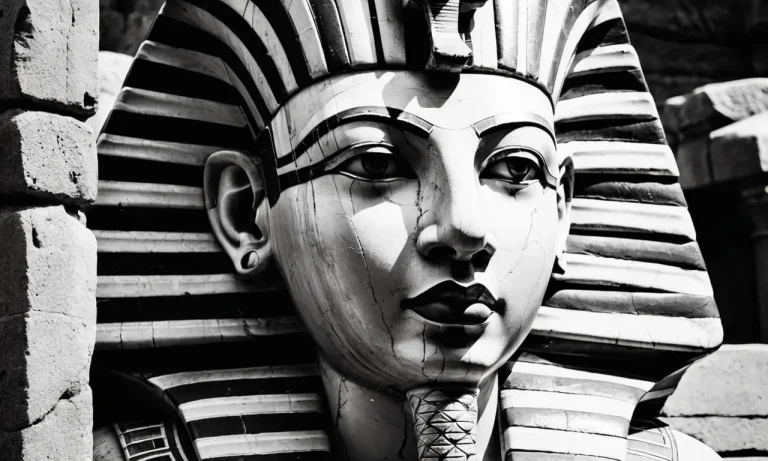Where Was I Before I Was Born? A Biblical Perspective
The question of where we were before we were born is an intriguing one that many people ponder. If you’re short on time, here’s a quick answer: according to the Bible, our souls did not exist before conception. Now, let’s explore this topic more fully.
In this comprehensive article, we will analyze biblical verses about the origins of human life and the nature of the soul. We will consider perspectives from different books of the Bible and scholarly commentary to piece together a holistic Christian viewpoint on where we were before birth.
The Bible is Largely Silent on Human Existence Before Conception
Genesis Account of Creation Focuses on Physical Life
The Genesis account of creation in the Bible primarily describes God’s creation of the physical world and the first human beings, Adam and Eve. It focuses on the origins of biological life as we know it.
The creation story traces the beginnings of the earth, plants, animals, and the first two human persons formed “from the dust of the ground” (Genesis 2:7). However, the Genesis narrative does not explicitly explore philosophical questions about the origins of the human soul or spirit.
It does not discuss whether humans had any prior spiritual existence before their physical conception and birth.
This silence leaves room for some difference of opinion among Bible scholars. Some suggest the creation of Adam and Eve in God’s image implies He directly imparted an immortal soul. Others argue He created only their physical bodies, later gifting them spirituality.
Either way, the biblical text itself does not provide definitive answers about any pre-conception spiritual life. Its narrative simply jumps from the creation of the world to the creation of humankind with breathtaking brevity.
Biblical Authors Do Not Explore Pre-Conception Spiritual Realms
Beyond the Genesis origin account, the Old and New Testament authors also have little to say about the era before an individual’s physical conception and birth. There are a few vague references to God knowing people before they were born (Jeremiah 1:5; Psalm 139:13-16), but these do not amount to an exploration of pre-conception existence.
Jesus’ statement about existing before Abraham (John 8:58) refers to Christ’s eternal divine nature, not human souls in general.
Biblical Principles Suggest the Soul Starts at Conception
The Bible does not explicitly state when the soul enters the body, but there are some principles and passages that suggest it occurs at conception. Here is an overview of the biblical evidence:
Humanity from Conception
The Bible teaches that unborn children are human persons. For example, the unborn John the Baptist “leaped for joy” in Elizabeth’s womb when Mary greeted her (Luke 1:41). This indicates he was a person capable of emotion even before birth.
Ancient biblical laws also treated the unborn as human persons who deserve protection. Exodus 21:22-25 gave strict penalties if fighting men accidentally harmed a pregnant woman or her child.
Formation of Body and Spirit
When God created human life, he first formed Adam’s body “from the dust of the ground” and then “breathed into his nostrils the breath of life” (Genesis 2:7). This suggests our physical body has to exist first before our spirit enters it.
Likewise, Zechariah 12:1 states that God “forms the spirit of man within him,” implying the physical body containing that spirit already exists. The soul seems to enter when the body is present in early development.
Speculation on Pre-Existence Contradicts Core Christian Doctrines
Reincarnation and Pre-Existence Imply No Need for Salvation
The concepts of reincarnation and pre-existence of souls contradict core Christian beliefs about salvation. If souls existed before birth and return to earth through reincarnation, then there would be no need for Jesus’ redemptive work on the cross.
Christianity teaches that all people have sinned and fall short of God’s glorious standard (Romans 3:23). Every human soul needs salvation, which comes through faith in Christ (Ephesians 2:8-9). However, reincarnation and pre-existence imply that souls can save themselves through multiple lifetimes of good works and spiritual progress.
Additionally, Christianity teaches that every person has only one life to accept or reject God’s offer of salvation (Hebrews 9:27). There are no second chances or return trips. Therefore, embracing pre-existence and reincarnation essentially renders Christ’s sacrifice unnecessary.
Belief We Selected Our Life Circumstances Undermines God’s Sovereignty
Some New Age philosophies suggest souls pre-exist in a spiritual realm and choose the circumstances of their next incarnation on earth. However, this belief severely undermines God’s supreme authority and governance of humanity’s story.
The Bible clearly teaches that God actively assigns people’s life situations according to His sovereign will (Psalm 139; Jeremiah 1:5; Galatians 1:15). Human beings have no control over fundamental matters like their ethnicity, gender, family inheritance, natural talents, disabilities, and more.
Yes, during our earthly lives we make real choices that influence our life course. But none of us selected the essential parameters that God wove into the tapestry of our lives before we were born. Embracing the idea that we designed our own life circumstances essentially positions us as the creators of our own stories—a privilege and power that belongs to God alone.
Conclusion
In the end, the Bible does not clearly state where human consciousness resides before conception occurs. But when we analyze the textual evidence and theological implications closely, the doctrinally consistent interpretation is that our soul begins at conception, not in a prior state.
While intriguing philosophical arguments may suggest otherwise, core Christian beliefs about salvation and God’s supreme authority point towards this creationist understanding of the origins of human inner life.








